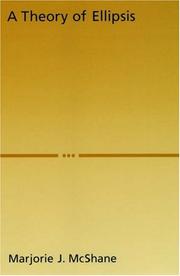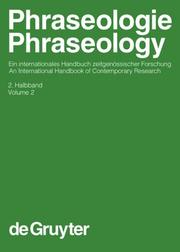| Listing 1 - 6 of 6 |
Sort by
|

ISBN: 1280534591 0195346483 1423722140 1602565317 9781423722144 9780195176926 0195176928 9781280534591 0197722695 9786610534593 6610534594 0190292083 Year: 2023 Publisher: Oxford : Oxford University Press,
Abstract | Keywords | Export | Availability | Bookmark
 Loading...
Loading...Choose an application
- Reference Manager
- EndNote
- RefWorks (Direct export to RefWorks)
This book presents a comprehensive theory of ellipsis that supports the formal, cross-linguistic description of elliptical phenomena. In contrast to earlier work, this study focuses on the interconnected factors that determine whether ellipsis should or should not be used in a given context.
Grammar, Comparative and general --- Ellipsis (Grammar) --- Ellipsis. --- Elliptical constructions --- Syntax --- Ellipsis --- Linguistics --- Philology
Multi
ISBN: 9780262045582 9780262363136 0262363135 9780262362603 0262362600 0262045583 Year: 2021 Publisher: Cambridge, Mass. The MIT Press
Abstract | Keywords | Export | Availability | Bookmark
 Loading...
Loading...Choose an application
- Reference Manager
- EndNote
- RefWorks (Direct export to RefWorks)
"An explantion of a knowledge-based system for creating computational agents with human-like language ability"-- "One of the original goals of artificial intelligence research was to endow intelligent agents with human-level natural language capabilities. Recent AI research, however, has focused on applying statistical and machine learning approaches to big data rather than attempting to model what people do and how they do it. In this book, Marjorie McShane and Sergei Nirenburg return to the original goal of recreating human-level intelligence in a machine. They present a human-inspired, linguistically sophisticated model of language understanding for intelligent agent systems that emphasizes meaning—the deep, context-sensitive meaning that a person derives from spoken or written language. With Linguistics for the Age of AI, McShane and Nirenburg offer a roadmap for creating language-endowed intelligent agents (LEIAs) that can understand, explain, and learn. They describe the language-understanding capabilities of LEIAs from the perspectives of cognitive modeling and system building, emphasizing “actionability”—which involves achieving interpretations that are sufficiently deep, precise, and confident to support reasoning about action. After detailing their microtheories for topics such as semantic analysis, basic coreference, and situational reasoning, McShane and Nirenburg turn to agent applications developed using those microtheories and evaluations of a LEIA's language understanding capabilities. McShane and Nirenburg argue that the only way to achieve human-level language understanding by machines is to place linguistics front and center, using statistics and big data as contributing resources. They lay out a long-term research program that addresses linguistics and real-world reasoning together, within a comprehensive cognitive architecture"--Publisher's description.
Book
ISBN: 0262362600 0262045583 Year: 2021 Publisher: Cambridge, Massachusetts ; London, England : The MIT Press,
Abstract | Keywords | Export | Availability | Bookmark
 Loading...
Loading...Choose an application
- Reference Manager
- EndNote
- RefWorks (Direct export to RefWorks)
"An explantion of a knowledge-based system for creating computational agents with human-like language ability"--
Computational linguistics. --- Natural language processing (Computer science) --- NLP (Computer science) --- Artificial intelligence --- Electronic data processing --- Human-computer interaction --- Semantic computing --- Automatic language processing --- Language and languages --- Language data processing --- Linguistics --- Natural language processing (Linguistics) --- Applied linguistics --- Cross-language information retrieval --- Mathematical linguistics --- Multilingual computing --- Data processing --- Computaitonal linguistics.
Book
ISBN: 0262380358 026238034X Year: 2024 Publisher: Cambridge, Massachusetts : The MIT Press,
Abstract | Keywords | Export | Availability | Bookmark
 Loading...
Loading...Choose an application
- Reference Manager
- EndNote
- RefWorks (Direct export to RefWorks)
"An argument if favor of hybrid AI systems over purely ML ones to increase machine transparency and human trust"--


ISBN: 9783110198317 9783110190762 Year: 2008 Publisher: Berlin ;; Boston De Gruyter Mouton
Abstract | Keywords | Export | Availability | Bookmark
 Loading...
Loading...Choose an application
- Reference Manager
- EndNote
- RefWorks (Direct export to RefWorks)
Digital

ISBN: 9783110795486 9783110795554 9783110795417 Year: 2023 Publisher: Berlin ;; Boston De Gruyter Mouton
Abstract | Keywords | Export | Availability | Bookmark
 Loading...
Loading...Choose an application
- Reference Manager
- EndNote
- RefWorks (Direct export to RefWorks)
| Listing 1 - 6 of 6 |
Sort by
|

 Search
Search Feedback
Feedback About UniCat
About UniCat  Help
Help News
News